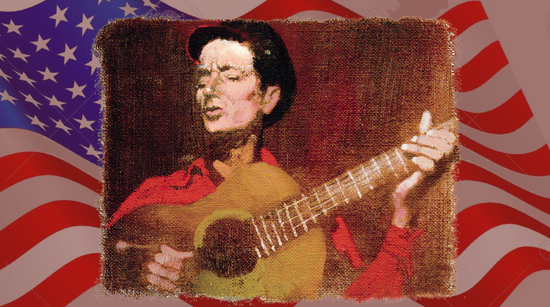Mindy Newell’s Post-Election Blues
I used to play the guitar. I never had any really talent for it, and soon put it away. But there was one song that I did learn. I did a pretty good job with it, too.
This land is your land, this land is my land
From California to the New York Island,
From the Redwood Forest, to the Gulf stream waters,
This land was made for you and me.
As I went walking that ribbon of highway
And saw above me that endless skyway,
And saw below me the golden valley, I said:
This land was made for you and me.
I roamed and rambled and followed my footsteps
To the sparkling sands of her diamond deserts,
And all around me, a voice was sounding:
This land was made for you and me.
Legendary folk artist and social commentator Woody Guthrie wrote This Land Is Your Land in 1940, reacting to Kate Smith’s recording of Irving Berlin’s God Bless America, which was played everywhere and constantly during during the Great Depression; he thought it purposely complacent about the terrible injustices being suffered by most of the American public which he had witnessed first-hand after leaving his native Oklahoma to travel the rails across America, eventually ending up in California, where the Dust Bowl refugees – “Okies” – who had migrated hoping to find a better life, and instead finding only more suffering and cruelty – see John Ford’s The Grapes of Wrath, or, even better, read the book by John Steinbeck – while the government did nothing
Why do I bring up this up? Because, when Guthrie recorded it in 1944 for Moe Asch at Folkways Records in New York City, Asch left out one particular lyric:
Was a high wall there that tried to stop me
A sign was painted said: Private Property,
But on the back side it didn’t say nothing –
This land was made for you and me.
Which, of course, made me think of our President-Elect.
And then, while doing a bit of research for this column, I found this from the New York Times, written on January 25 of this year by reporter Thomas Kaplan:
“More than a half-century ago, the folk singer Woody Guthrie signed a lease in an apartment complex in Brooklyn. He soon had bitter words for his landlord: Donald J. Trump’s father, Fred C. Trump.
“Mr. Guthrie, in writings uncovered by a scholar working on a book, invoked ‘Old Man Trump’ while suggesting that blacks were unwelcome as tenants in the Trump apartment complex, near Coney Island.
“‘He thought that Fred Trump was one who stirs up racial hate, and implicitly profits from it,’ the scholar, Will Kaufman, a professor of American literature and culture at the University of Central Lancashire in Britain, said in an interview…[who] about his findings … for The Conversation, a news website.
“In December 1950, Mr. Guthrie signed a lease at the Beach Haven apartment complex, Mr. Kaufman wrote in his piece. Soon, Mr. Guthrie was ‘lamenting the bigotry that pervaded his new, lily-white neighborhood,’ [Mr. Kaufman] wrote, with words like these:
‘I suppose / Old Man Trump knows / Just how much / Racial Hate / he stirred up / In the bloodpot of human hearts / When he drawed / That color line / Here at his / Eighteen hundred family project’
“Mr. Guthrie even reworked his song ‘I Ain’t Got No Home’ into a critique of Fred Trump, according to Mr. Kaufman:
‘Beach Haven ain’t my home! / I just can’t pay this rent! / My money’s down the drain! / And my soul is badly bent! / Beach Haven looks like heaven / Where no black ones come to roam! / No, no, no! Old Man Trump! / Old Beach Haven ain’t my home!’
“Mr. Guthrie died in 1967, and in the 1970s, the Justice Department sued the Trumps, accusing them of discriminating against blacks. (A settlement was eventually reached; at the time, Trump Management noted the agreement did not constitute an admission of guilt)…
“Mr. Kaufman, the author of ‘Woody Guthrie, American Radical,’ said Mr. Guthrie would be repulsed by the presidential candidacy of Donald Trump. He pointed to Mr. Trump’s comments about Mexicans and Muslims, and contrasted the candidate’s sentiments to those of Mr. Guthrie in his song ‘Deportee,’ written about a plane crash that killed Mexican farm workers…
“‘Woody was always championing those who didn’t have a voice, who didn’t have any money, who didn’t have any power,’ Mr. Kaufman said. ‘There’s no doubt that he would have had maximum contempt for Donald Trump, even without the issue of race.’”
So…
What now?
As someone posted on Facebook, maybe Superman can start fighting the Klu Klux Klan again.
This land was made for you and me.













